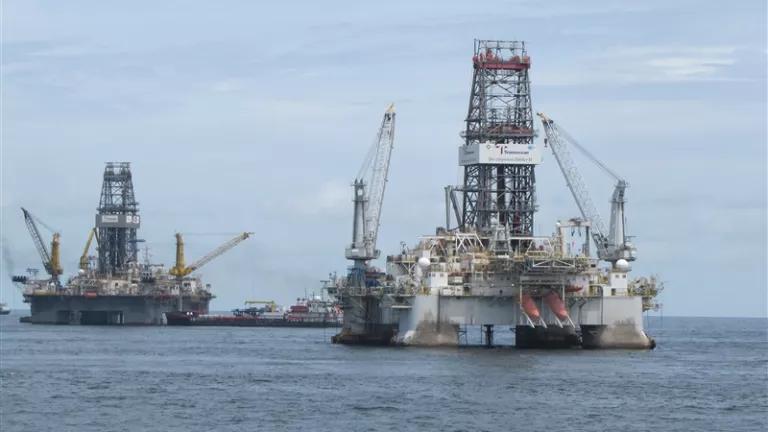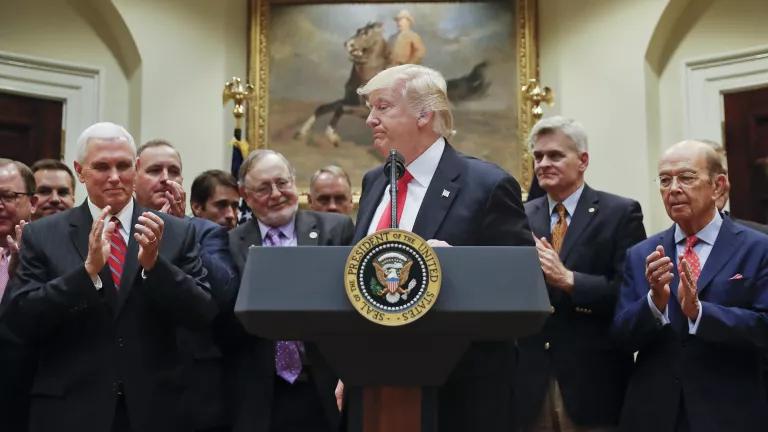Interior Moves Forward with Oil & Gas Leasing
The Biden administration has made clear its intent to fix the broken system for leasing public lands. Today’s announcement is a reminder of how pressing it is to make those reforms happen.

We’ve written before that while the Inflation Reduction Act (IRA) makes historic investments in climate, balances the scales for taxpayers, and raises needed revenue it also includes some handouts to the fossil fuel industry. Today, we see those handouts begin to take effect as the Department of Interior (DOI) moves on new offshore and onshore oil and gas leasing that was less likely to proceed prior to passage of the IRA.
With the news that OPEC plans to slash oil production in an attempt to keep global oil prices high, industry pressures to lock us into further oil dependence are once again ramping up. It’s an important reminder that today’s actions from DOI won’t help alleviate the pressures created by OPEC’s moves. Instead, it is likely to prolong our oil addiction for the years to come and slow the transition away from fossil fuels that would free us from the market manipulations of OPEC and the global oil industry.
As a recap, under the IRA, in order to hold lease sales or issue permits for renewable energy both onshore and offshore, the federal government must also hold lease sales for oil and gas within a certain time frame. In addition, DOI is required to hold a number of specific offshore lease sales regardless of whether it seeks to issue renewable energy leases.
Here is what DOI has decided are its next steps to implement these mandates:
For the ocean:
The Bureau of Ocean Energy Management (BOEM) has taken steps to move forward with two of the specifically-required lease sales: Lease Sale 259 and 261 in the federal waters of the Gulf of Mexico. Lease Sale 259 is to be held by March 31st, 2023 and Lease Sale 261 is to be held by September 30th, 2023. Today, BOEM released its Draft Supplemental Environmental Impact Statement for public comment. The deadline for submission of public comments is November 21st and here’s how to comment. It is also worth noting that TODAY also happens to be the last day of the public comment period for the National Outer Continental Shelf Offshore Oil and Gas Leasing Program, which represents BOEM’s long-term plan for offshore drilling. Join us in asking for no new offshore oil and gas leasing here.
NRDC will be diving more into the Draft Supplemental Environmental Impact Statement on Lease Sales 259 and 261 in the weeks to come. But we already know now that Gulf communities have been saddled with the burdens of the oil and gas industry for too long, and the last thing they need is more offshore oil and gas development to threaten the communities, the environment, and the climate.
For lands:
In a similar vein to what is happening offshore, the Bureau of Land Management (BLM) announced it will begin scoping for the next onshore oil and gas lease sales in New Mexico, Wyoming, Kansas, and Nebraska, with the majority of area under consideration in Wyoming. Unlike offshore leasing, the IRA does not require that specific areas be offered for lease, nor does it define a rigid number of leases or leased acres. Thus, we are watching closely for how the BLM chooses to implement the IRA’s onshore provisions and mitigate the unnecessary damage that overzealous leasing would cause given the continuing backlog of already-leased areas and already-issued drilling permits industry continues to stockpile.
BLM’s decision to proceed so quickly with consideration of new leases also places pressure on the agency to deliver on its long-promised suite of reforms to the outdated and inefficient onshore oil and gas program. This includes implementing the new royalty and rental rates included in the IRA, ending the wasteful and corrupt practice of noncompetitive leasing, and addressing the reform items the agency highlighted in its November 2021 report. Those additional reforms included updated bonding requirements to ensure oil and gas companies pay to clean up their wells, ending the leasing of lands with minimal potential for development, and improving Tribal consultation and public engagement.
The forward movement on the two offshore lease sales makes it all the more critical that BOEM use its discretion on the five-year program, issuing a plan that does not include any offshore leasing. This administration has made clear its intent to fix and update the country’s broken system for leasing public lands, and today’s announcement is a reminder of how pressing it is to make those reforms happen.
We need to end our reliance on oil and gas and transition to justly-sourced renewable energy.




